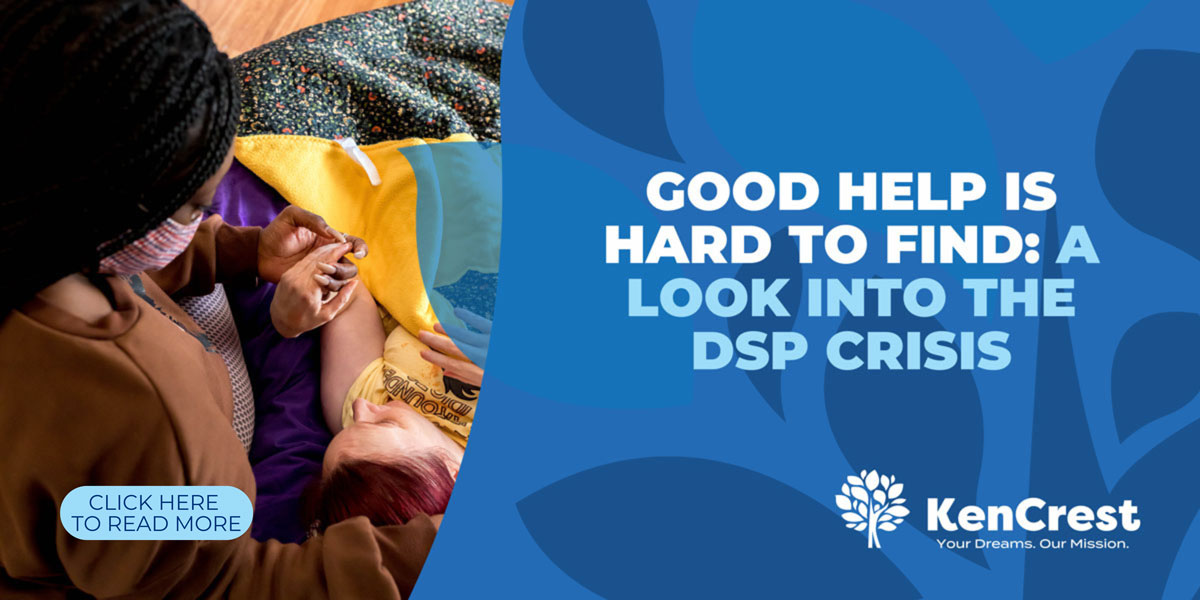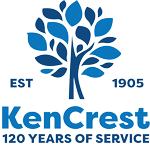
*This story was originally published in Possibilities Issue 1, a KenCrest Magazine*
Around the United States, thousands of Community Living homes are short-staffed due to the ongoing Direct Support Professional (DSP) crisis.
Banita Clark flutters from room to room before darting out of the bathroom carrying a cold curling iron. She plugs it in under the large bay window in the living room before disappearing once again into one of three bedrooms. Banita is a Lead Direct Support Professional (DSP) at a Community Living group home in Willow Grove, PA and works every weekday from 3-11 p.m. Banita reappears pushing Aigner—one of the three ladies who reside there—in a large fluorescent pink wheelchair, towards the window. She quickly spins the chair around with Aigner now facing an elaborate photo collage of loved ones sitting above the fireplace mantle. At the center is a group portrait of Aigner, her housemates Shannon and Khadijah (DeeDee), and five additional staff members including Banita, all dressed in white blouses and blue jeans. The photos are a testament to the bond the housemates and their DSP’s built over nearly a decade together. It’s not uncommon for DSPs to become like surrogate parents or siblings to the people they support.
Banita remains the only DSP from the photo still employed because of a massive workforce crisis plaguing the human services industry.
She leans Aigner’s chair back, locks it, and once again hastily disappears into the back bedrooms before returning with each of Aigner’s housemates, one at a time, repeating the process of lining them up and leaning them back, making a semi-circle around her. She pulls out her cell phone and scrolls before landing on LL Cool J’s “Around the Way Girl,” which promptly blares through the Bluetooth speaker near the front door. Khadijah calls out with a shrilling voice, “Banita, Banita! That’s LL Cool J, that’s my song!”
“Yes, DeeDee it is,” Banita replies, as she picks up the heated curling iron off the floor. Encircled by the three wheelchairs, one by one, Banita curls the ends of the women’s ponytails: each different than the last. Having supported the women for the past eight years—she knows what they like—but it’s only during her shifts that Aigner, Shannon, and DeeDee get glammed up the way they love.
“In 2021 alone—over 50 percent of DSPs nationwide left their jobs for new placements due to low wages, lack of support, and demanding schedules.”
Over half the Direct Support Professionals (DSP) who care for them at their home work for temp agencies. None of the newer staff have gotten to know the three housemates’ preferences and personalities beyond their basic health care, daily routines, and dietary restrictions outlined in the ladies’ Individual Support Plans (ISPs). Like the thousands of Community Living homes throughout the United States, Aigner, Shannon, and DeeDee’s home is short-staffed due to the ongoing DSP crisis experienced by human services providers everywhere.
It is a crisis that’s been magnified by the coronavirus pandemic. In 2021 alone—over 50 percent of DSPs nationwide left their jobs for new placements due to low wages, lack of support, and demanding schedules.
Providers everywhere are scrambling to fill staff vacancies with temp agency placements to ensure the safety of the people in their programs. Human services providers are funded by Medicaid Home and Community Based Services (HCBS), which dictates the hourly rates providers pay DSPs. Under current HCBS regulations, the average hourly rate paid to a direct care worker is $14.37, with little prospect of a raise in sight.
Provider agencies like KenCrest are left to complete with the retail, food service, and hospitality industries that hire employees at $15-23 per hour, with guaranteed regular pay increases. Conversely, the disparity in wages, supports, and opportunity—has forced people with disabilities and their families to suffer staffing shortages and settle for less-than-quality care. In 2021, there were over 17,415 people with intellectual disabilities (I/DD) throughout the United States waiting to enroll in the Medicaid HCBS waiver, according to KFF—an independent source for health policy research, polling, and journalism.

While the position lacks career mobility, for DSPs like Banita, it’s the people who keep them around. “I like seeing them happy and knowing that I’m helping them make a change in their own lives,” Benita says.
Over the last 40 years the role of a Direct Support Professional has become more demanding, yet less credentialed. In 1977, most human services providers required DSPs to have two to four years of college, followed by several weeks of orientation and training, to qualify for the position of caring for a person with I/DD.
By 2021 the typical DSP receives a few days’ worth of agency orientation, compliance training, and hands-on instruction. DSPs are immediately expected to attain fluency in safety and abuse prevention protocols, and quickly master extensive documentation processes; all while learning the specifics of the ISPs for the people they support. Unlike new hires in other industries, DSP’s can expect little, or zero support as they acclimate to their suite of responsibilities. The lack of credentialing paired with demanding shift schedules, limited support, and low wages, has led to higher DSP burnout rates and position turnover across their programs; resulting in higher overtime costs, financial challenges for agencies, and fewer opportunities for those being supported to establish relationships with their caregivers.
RELATED: Celebrate DSP Week With KenCrest
In July 2020, more than 77 percent of 191 providers surveyed by the American Network of Community Options and Resources (ANCOR) reported that they had discontinued at least one service, with 16 percent anticipating the closures would be permanent. Despite the bleak odds faced by human services providers across the country, there are several—including KenCrest—who see the opportunity to reframe staffing challenges and improve the meaningful support provided by staff like Banita Clark, and foster the same memorable bonds that Aigner, Shannon, and DeeDee came to know and love.
KenCrest and other human services providers across the country continue to advocate regularly for increases in HCBS funding to credential and improve the hourly wage rate for DSPs and lobby to increase funding for innovative support options like enabling technologies and prioritizing resources for people with disabilities to live more independently or with their families. By making small shifts in service delivery and support—KenCrest and those like it—can build back a strong direct care workforce and the meaningful connections that matter.
